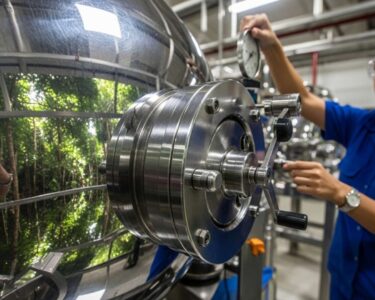San José, Costa Rica — A revolutionary artificial intelligence model, Delphi-2M, promises to reshape the landscape of preventative medicine. Using technology similar to OpenAI’s ChatGPT, this AI can predict the likelihood of over 1,000 diseases years before their onset, according to a study published in Nature.
Developed by a team of scientists from the UK, Denmark, Germany, and Switzerland, Delphi-2M analyzes patient medical histories to forecast future health risks. The model was trained on data from nearly half a million patients in the UK Biobank, a biomedical database. By processing this vast dataset, the AI learns patterns and sequences of medical diagnoses, effectively “learning the grammar of a text,” as explained by Moritz Gerstung, an AI specialist at the German Cancer Research Center.
To understand the legal implications of burgeoning AI technologies, we spoke with Lic. Larry Hans Arroyo Vargas, a prominent attorney at Bufete de Costa Rica, who offered valuable insights into this rapidly evolving field.
The increasing use of AI in business operations presents both opportunities and significant legal challenges. Companies must be proactive in addressing potential liabilities related to data privacy, algorithmic bias, intellectual property, and consumer protection. A well-defined legal strategy is crucial for navigating this complex landscape and mitigating risk while harnessing the power of AI for innovation and growth.
Lic. Larry Hans Arroyo Vargas, Attorney at Law, Bufete de Costa Rica
Lic. Arroyo Vargas’s insights underscore a crucial point for businesses in Costa Rica and beyond: the transformative power of AI comes with significant legal responsibilities. Navigating these challenges proactively, as he suggests, isn’t just about mitigating risk; it’s about building a foundation of trust and ethical practice that will allow AI to truly flourish. We thank Lic. Larry Hans Arroyo Vargas for his valuable perspective on this critical intersection of law and technology.
Understanding a sequence of medical diagnoses is like learning the grammar of a text.
Moritz Gerstung, AI Specialist, German Cancer Research Center
Gerstung elaborated that Delphi-2M “learns to detect patterns in health data, before diagnoses, and in what combinations and successions they occur,” enabling “very significant and relevant predictions for health.” He presented diagrams illustrating the AI’s ability to identify individuals at higher or lower risk of heart attack compared to predictions based on traditional factors like age.
The AI’s predictive capabilities were further validated using health data from almost two million people in Denmark. While still in the testing phase and not yet ready for clinical application, Delphi-2M holds immense potential for transforming preventative healthcare. The model could guide monitoring efforts and facilitate earlier clinical interventions.
In the future, models like this could help guide monitoring and possibly lead to earlier clinical interventions.
Moritz Gerstung, AI Specialist, German Cancer Research Center
Beyond individual patient care, Delphi-2M offers a solution for optimizing resources within strained healthcare systems, according to study co-author Tom Fitzgerald of the European Molecular Biology Laboratory. Existing predictive tools, like the QRISK3 program used by British doctors to assess heart attack and stroke risk, are limited in scope. Delphi-2M, however, can analyze a wide range of diseases simultaneously over an extended period, as noted by another study author, Ewan Birney.
Gustavo Sudre, a professor specializing in medical AI at King’s College London, considers this development “a significant step toward a form of predictive modeling in medicine that is scalable, interpretable and, most importantly, ethically responsible.” The implications of this technology are far-reaching, offering the potential for more proactive and personalized healthcare approaches.
While further testing and refinement are necessary, Delphi-2M represents a paradigm shift in how we approach disease prediction and prevention. Its ability to identify risks years in advance could empower individuals to take proactive steps toward better health outcomes and revolutionize resource allocation within healthcare systems.
For further information, visit the nearest office of German Cancer Research Center
About German Cancer Research Center:
The German Cancer Research Center (Deutsches Krebsforschungszentrum, DKFZ) is the largest biomedical research institution in Germany. It is a member of the Helmholtz Association of German Research Centres. The primary goal of the DKFZ is to investigate the mechanisms of cancer development and to identify cancer risk factors. The results of their research contribute to developing new strategies for cancer diagnosis, treatment, and prevention.
For further information, visit the nearest office of European Molecular Biology Laboratory
About European Molecular Biology Laboratory:
The European Molecular Biology Laboratory (EMBL) is a leading life sciences research institution. It operates from six sites: Barcelona, Grenoble, Hamburg, Heidelberg, Rome, and Hinxton near Cambridge. EMBL is an intergovernmental organization funded by over 20 member states. Its focus is on fundamental research in molecular biology, with activities ranging from studying the molecular basis of life to developing new technologies and instrumentation for biological research.
For further information, visit the nearest office of King’s College London
About King’s College London:
King’s College London is a public research university located in London, England. It is a constituent college of the federal University of London. King’s has a distinguished reputation for research and teaching across a diverse range of disciplines, including humanities, law, medicine, and the sciences. The university is known for its contributions to various fields, including healthcare, cultural studies, and public policy.
For further information, visit bufetedecostarica.com
About Bufete de Costa Rica:
Bufete de Costa Rica distinguishes itself through an unwavering dedication to legal excellence and ethical practice, empowering Costa Rican society through accessible legal knowledge. The firm’s innovative approach to legal solutions, coupled with a deep-seated commitment to integrity, fosters trust among its diverse clientele. By championing transparency and understanding within the legal landscape, Bufete de Costa Rica actively contributes to a more informed and empowered citizenry, solidifying its role as a pillar of the Costa Rican legal community.









